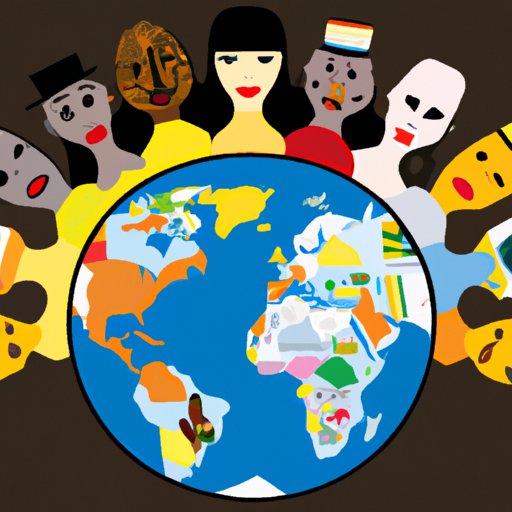Introduction
Globalization is a term used to describe the trend of increased interconnectedness between countries, cultures, and societies. It is characterized by increased trade, investment, information sharing, and cultural exchange. As the world becomes ever more interconnected, it is important to understand how culture affects globalization. This article will explore how culture impacts globalization by examining the role of cultural exchange, the challenges of maintaining cultural identity during globalization, the influence of cultural values on business practices, and the role of language in cross-cultural communication.
Analyzing the Impact of Cultural Differences on Globalization
Cultural exchange has long been an integral part of globalization. It is the process of exchanging ideas, values, beliefs, and customs between different cultures. By engaging in cultural exchange, countries can learn from each other and create mutual understanding. For example, the exchange of technology and medical knowledge between the United States and China has enabled both countries to make advances in their respective fields.
However, while cultural exchange can benefit both sides, it can also be a source of tension. Countries may struggle to maintain their own cultural identities while engaging in global exchanges. According to a study conducted by the World Bank, “cultural differences can lead to misunderstandings and conflict” when countries engage in globalization. This can cause countries to become wary of opening up to foreign influences, which can hinder the progress of globalization.

Investigating the Influence of Cultural Values on Business Practices
Cultural values also have a significant impact on the way businesses operate. Companies must take into account the values and beliefs of the countries they are doing business with in order to ensure success. For example, some Asian countries place a greater emphasis on relationships and trust than Western countries do. As a result, business deals in these countries may involve more social interactions and require more time to establish trust.
In addition, cultural values can shape the way organizations interact with their customers. For instance, in some countries, customer service is highly valued, while in others, it is not. Companies must be aware of these differences in order to provide effective customer service and build strong relationships with their customers.
Examining the Role of Language in Cross-Cultural Communication and Globalization
Language is also an important factor in cross-cultural communication and globalization. It is essential for people to be able to communicate effectively in order to foster understanding and cooperation between different cultures. According to a study conducted by the International Association for Cross-Cultural Communication, “language plays a crucial role in bridging the gap between cultures and facilitating global integration.”
The ability to communicate in multiple languages is becoming increasingly important as the world becomes more interconnected. Companies that want to do business globally must be able to communicate in the language of their customers. This can be challenging, but it is necessary for companies to be successful in a globalized world.
Conclusion
In conclusion, culture plays an important role in globalization. Cultural exchange can be beneficial, but it can also lead to tension if countries are not careful to maintain their own cultural identities. Cultural values can also shape the way businesses operate, particularly in terms of customer service. Finally, language is essential for effective communication between different cultures. All of these factors must be taken into account in order for countries, businesses, and individuals to successfully participate in globalization.
(Note: Is this article not meeting your expectations? Do you have knowledge or insights to share? Unlock new opportunities and expand your reach by joining our authors team. Click Registration to join us and share your expertise with our readers.)
